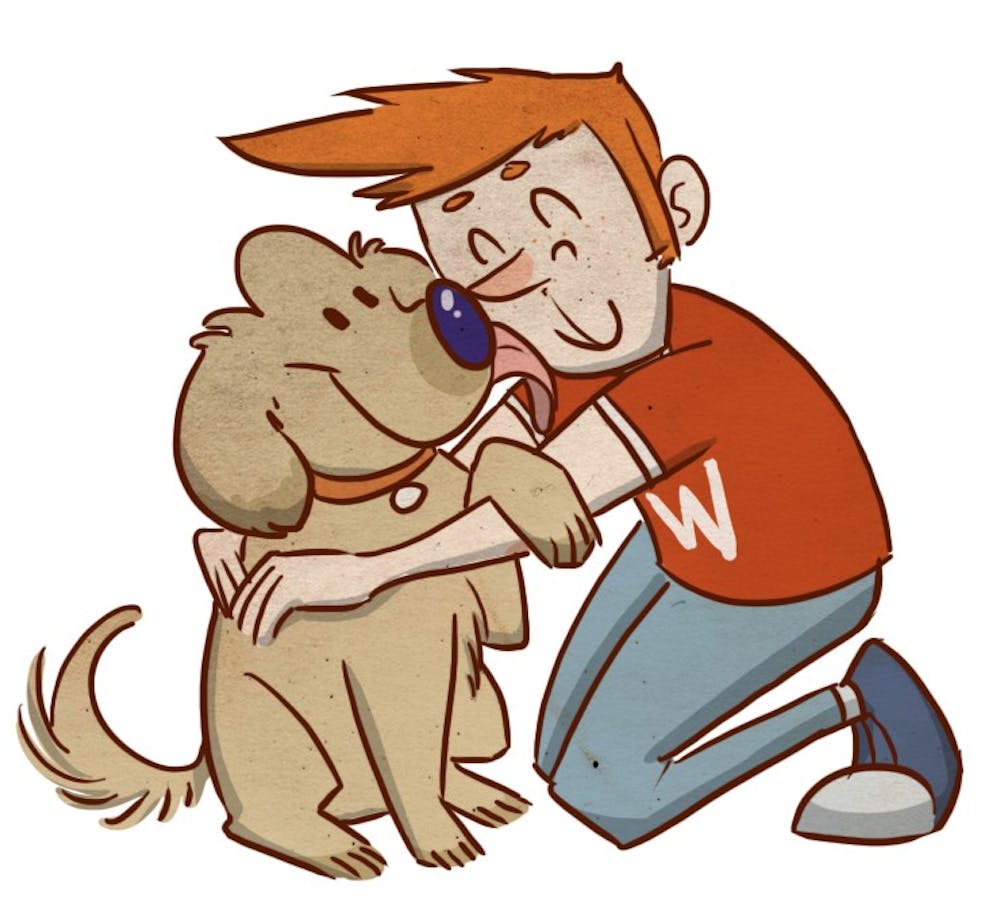Twice a week, four or five temperament-tested dogs make visits to pediatrics patients at UW Health's American Family Children's Hospital. The dogs, which work as part of a pet therapy program called Pet Pals, visit sick children, even those who have been immuno-supressed because of chemotherapy or transplants.
""There have been a lot of parents that have said to us, ‘That's the first time I saw my child smile in a week,'"" said Linda Sullivan, Pet Pals coordinator and review coordinator at the School of Veterinary Medicine at UW-Madison.
In total, the program works with 25 dogs and visits approximately 1,000 children each year, Sullivan said. The program, which started making visits in 1996, crafted a medical protocol for testing dogs to ensure they would be safe around children who were hospitalized for more severe illnesses.
Pet-assisted therapy, while still considered alternative therapy, is proving to have positive effects in the Madison area.
Pet therapy and children
""There have been studies that have shown benefits for adults,"" Sullivan said. ""Self-esteem increases, increased self-worth, general happiness, feeling of belonging, those sorts of things.""
But the lack of research into the emotional relationship between pets and children,allowed Pet Pals to fill that gap, Sullivan said. In fact, the Pet Pals program was part of research conducted by the University of Wisconsin Hospitals and Clinics that was published in a study called ""Play and Pets.""
The study revealed that the children involved in pet therapy displayed significantly more positive effects 57 percent of the time, than children engaged in child-life therapy.
Toni Schriver, founder of Pawws to Heal, a non-profit organization that provides animal-assisted therapy to children who have suffered physical or sexual abuse, also believes pet therapy works.
""It's kind of like art therapy, where conventional therapy may not be reaching them, we use animals,"" Schriver said.
Pawws to Heal, like Pet Pals, is an outreach program that uses animals as tools to engage with children. While Pet Pals restricts their volunteers to temperament-tested dogs, Pawws to Heal works with a variety of animals.
""It's not like they come in and just play with the animals,"" Schriver said. ""It's the dynamic of trying to re-establish social boundaries.""
Schriver works with two children every week and hosts programs on alternating months for 25-30 children. Davian, a child Schriver has been working with consistently for two and a half years, wouldn't even make eye contact with her when Davian first started engaging in pet assisted therapy. According to Schriver, after six months, Davian showed a lot of progress.
""He started opening up, he started interacting, he started engaging in activities,"" Schriver said. ""And that's a huge step for a child that's endured the things that he's endured.""
Davian now helps as a mentor for other children in the Pawws to Heal program.
Pet therapy and student life
While Pet Pals and Pawws to Heal uses pet therapy specifically with children, Bob McGrath, coordinator of Mind, Body and Health at the University Health Services created Counseling Canines, a program that allows students to engage with animals therapeutically on campus.
Ten to 12 staff-owned dogs who have been temperament-tested for Counseling Canines make an appearance each May during finals week, to help students relax, by serving as a stress reducer. During their two hours on Library Mall, the program usually sees about 400 students, McGrath said.
But for Schriver, the relationship between humans and animals is something that cannot be recreated.
""It's like an unconditional trust, patience and love,"" she said. ""You can beat the crap out of a dog and it will still be loyal to you and we can't understand why that is.""
Schriver says this can be characterized simply by a pet that shows happiness when its owner arrives home from work or school.
UW-Madison junior Dan Wirz is familiar with the therapeutic effects of owning a pet.
Wirz adopted Nanook, a Siberian husky, at the beginning of the school year before moving into a pet-friendly house on campus.
""Nanook is always there and happy simply because I am walking, talking and breathing, which is always reassuring after a long class day,"" said Wirz.
Like the dogs Pawws to Heal works with, according to Wirz, Nanook doesn't judge him.
""The only thing Nanook judges me for is not getting up fast enough when he wants to go on a walk,"" Wirz said. ""But by the time I pick up his leash he's already forgotten.""
Facing obstacles on campus
McGrath considers pet therapy effective for students on the UW-Madison campus, however he recognizes its possible drawbacks.
""Pets can be a stress reducer,"" McGrath said. ""But if you have to be responsible for [a pet], it can sometimes be a stressor as well, if you consider stress any demand on your time.""
However, Wirz finds Nanook helps him become more responsible about following his daily routine.
""Rather than waking up 15 minutes before class and racing, I have to consider the fact that [Nanook] is being affected directly by my scheduling,"" Wirz said.
Besides time management, McGrath sees other obstacles in housing on campus and the amount of space in apartments and residence halls.
""I think that's part of the student culture,"" he said.
But Schriver thinks that if students can financially support a pet, the experience would be very rewarding.
""You're still going to be stressed, you have exams and papers, but it's more of a calming effect,"" she said.
Sullivan saw this effect in a class at the UW School of Veterinary Medicine, as the students were able to interact with a service dog that accompanied a hearing-impaired student to class each day.
""I think that class was one of the happiest, most well-adjusted classes that we've had at this school,"" Sullivan said.
Pet therapy is still considered alternative, but unlike different types of stress management, Bob McGrath sees pet therapy as a relaxing and likeable activity.
""Our experience is that students really enjoy [pet therapy] and actually miss their pets a lot,"" he said. ""Like most therapies, some people respond more to one type than another.""






